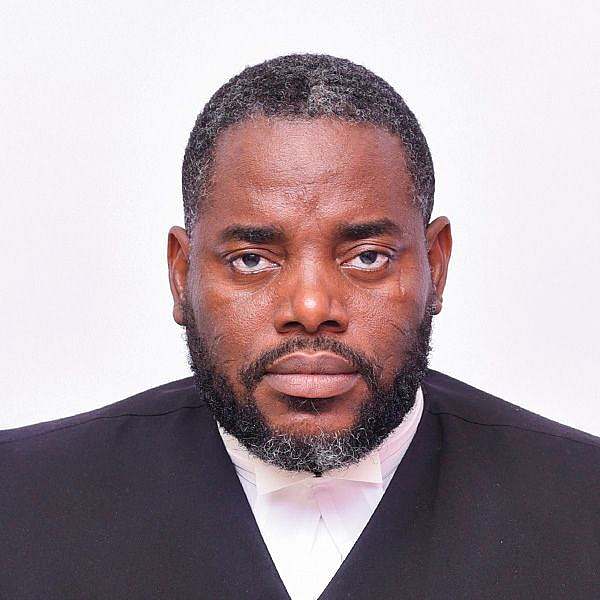Advocating for Justice and Fairness: Speech by Somina Peter Johnbull, Esq., Chairman, NBA Yenagoa Branch, at the 2023/2024 LEGAL YEAR COMMENCEMENT CEREMONY.
My Lords, on behalf of the Bar in Bayelsa State, which is made up of the Yenagoa and Sagbama Branches of the Nigerian Bar Association, we congratulate the Bayelsa State Judiciary on the occasion of the event to commemorate the commencement of the 2023/2024 Legal Year.
This year’s event is unique on two fronts. For many years, we have held the opening ceremony after the Legal Year has already commenced. Since my foray into Bayelsa State as a Youth Corper in 2008, this is the first time this ceremony has been held in the week of the commencement of a Legal Year. It is our hope that this practice would be maintained moving forward.
Another remarkable feature that headlines today’s event is that this ceremony is presided over by a new head of the Bayelsa State Judiciary, the Hon. Justice Matilda Abrakasa Ayemieye, the 4th substantive Chief Judge of Bayelsa State. On behalf of the Bar, we extend our hands of fellowship and support in working with My Lord, the Chief Judge, to build on the strong foundations on which the Bayelsa State Judiciary is laid. We wish to place on record that the Chief Judge is a true “Barman,” and we are impressed not only by the vision outlined by My Lord but also by the early steps that have been taken since My Lord’s assumption of office.
We cannot fail to honor the memories of the immediate past Chief Judge, Hon. Justice Kate Abiri, (Rtd), CON, Life Bencher, DSSRS, for My Lord’s distinguished service in the Bayelsa State Judiciary. Unfortunately, My Lord left this earthly realm six months after retirement to join the “cloud of witnesses” in heaven, and we can draw strength and inspiration from the wonderful legacies of My Lord, even as we once again sympathize with the Judiciary over that very painful and shocking death.
This ceremony that we are holding today has its roots in great antiquity. It is recorded that sometime during the Middle Ages, Judges had the religious practice of praying for guidance at the start of the legal term. This was a recognition of the fact that the Court and all persons involved in the administration of justice need divine guidance to discharge the divine assignment thrust upon them.
Thereafter, a court session would be held to highlight the projection for the coming year and matters of public interest that affect the Judiciary and the administration of justice.
My Lord, the Chief Judge, permit me to utilize this auspicious opportunity afforded by this occasion to address a few issues related to the administration of justice.
Remuneration of Judges and Magistrates: An independent Judiciary is the right of every Nigerian and a necessity for the rule of law to be upheld. It is our view that fair remuneration of Judicial Officers (and this is used in an omnibus sense to include Judges and Magistrates) is an important pillar on which an independent Judiciary is erected.
The current remuneration of Judges and Magistrates cries for an urgent upward review. It is sad to note that between 1999 and 2011, while the Federal Government reviewed the remuneration of public servants and political officers upwards, that of the Judges, like the rock of Gibraltar, has remained unmoved.
It is hypocritical to restrict Judicial Officers from engaging in business ventures and then not pay them well. A Legislator earns more in four years than what a Judge would earn in twenty years!
Poor remuneration would drive away the best of lawyers from accepting to be Judges, and yet it is expected that it is the best of lawyers who should be Judges. The right remuneration would encourage Judges and Magistrates to lead and live honestly.
Distinguished ladies and gentlemen in this very epochal assembly, I urge all of us who can, to lend our voices for the salaries of our Judges and Magistrates to be substantially increased, and this must be done urgently. An appointment to the Bench should not be an invitation to penury.
A study by the African Bar Association (AfBA) reveals that Judges in Nigeria earn far less than their counterparts in South Africa, Gabon, Kenya, Zambia, Tanzania, and Ghana. Even though I believe that our Judges and indeed our Magistrates are overworked by the elephantine caseload which they are expected to dispose of.
It is our expectation that these words would echo into the Chambers and offices of all those who have responsibilities to ensure the actualization of fair remuneration for our Judges and Magistrates, to act speedily.
The Judiciary is not an inconvenient necessity. No, it is not, and we must resist such a notion. Rather, a strong and truly independent Judiciary is the bedrock of the development of society.
Covert Intimidation of Judges and the Judiciary: Prior to the delivery of judgment by the Court of Appeal with respect to the Presidential elections on the 6th of September, 2023, we witnessed an unfortunate spectacle where misguided persons began a campaign entitled “all eyes on the Judiciary.” I thought that this distasteful act was limited to social media until I saw huge billboards mounted at strategic places in Abuja, and one was even very close to the precincts of the Court of Appeal Complex, emblazoned with the words “All Eyes on the Judiciary.”
There are two civilized ways in which judgments of courts can be challenged. The first is by filing an appeal, and the other is by writing a critique in a law journal. The display of signboards, banners, and even roadshows as we saw is condemnable and most uncharitable.
The preponderance of vocal public opinion is not the barometer to certify the accuracy of the judgment of a court. Judgments of courts are predicated on the law, facts pleaded, and evidence furnished in the courtroom, not aliunde.
 As Niki Tobi, JSC pointed out, about fourteen years ago, in ABUBAKAR v. YAR’ADUA (2008) 19 NWLR (PT 1120) 1@174: “Courts do not give judgment according to public opinion or to reflect public opinion unless such opinion represents or presents the state of the law. This is because the judge’s clientele is the law and the law only. Public opinion is, in most instances, built on sentiments and emotions. Both have no company with law. They are kilometers and kilometers away from the law. The pulse of Nigeria’s public opinion, if I can feel it, in this case, is to allow the appeal on the speculation or should I say belief that the election was irregularly conducted in violation of the Electoral Act. The concern of the court is whether the appellants have proved their case.
As Niki Tobi, JSC pointed out, about fourteen years ago, in ABUBAKAR v. YAR’ADUA (2008) 19 NWLR (PT 1120) 1@174: “Courts do not give judgment according to public opinion or to reflect public opinion unless such opinion represents or presents the state of the law. This is because the judge’s clientele is the law and the law only. Public opinion is, in most instances, built on sentiments and emotions. Both have no company with law. They are kilometers and kilometers away from the law. The pulse of Nigeria’s public opinion, if I can feel it, in this case, is to allow the appeal on the speculation or should I say belief that the election was irregularly conducted in violation of the Electoral Act. The concern of the court is whether the appellants have proved their case.
Even if the Justices of the Court of Appeal were in the field of the election and saw irregularities and inwardly expressed some anger at the way the election was held, the adversary nature of our jurisprudence will not allow them to use what they saw to give judgment in favour of the appellants.
There is no justification for veiled or direct intimidation of the Judiciary. It is unacceptable, and we must deprecate this unruly trend; otherwise, we would wake up someday and see mounted at Opolo roundabout or even Swali market, a billboard calling attention with respect to a matter slated for judgment in our courts.
Lawyers and the media must never give credence to the notion that the Judiciary is not independent or that the decision of a court can be guided by anything other than the law, facts pleaded, and evidence adduced.
May that day never come wherein our Courts would close its eyes and ears to the evidence before it and choose to ride on the back of public opinion, that unruly horse that gallops untamed. Amen.
The physical structure of our Magistrates’ and Customary Courts: My Lords, the physical structure of the courthouse is an important factor in access to justice. It is, therefore, important that court facilities are safe, accessible, and convenient to use by persons who throng our courts seeking determination of their complaints.
Most of the buildings housing the Magistrate and Customary Courts, especially those outside Yenagoa, are in various states of disrepair. Roofs are leaking, ceilings and floors are collapsing, seats for lawyers and litigants are bad, and this impairs efficient utilization and optimal productivity. In most of these courts, the chambers for the Magistrates and the Presiding Chairmen would not even promote efficiency.
It is heartwarming that the Chief Judge has taken note of the state of the courts outside Yenagoa and has begun to take steps to renovate them. We note that renovation work has started with respect to the courts in Kaiama as well as Sagbama. However, since this is an event that has the presence of the members of the Executive and Legislative Arms of the Bayelsa State Government, it is important to raise it so that more funds can be appropriated and released to the Judiciary for the execution of capital projects in this Legal Year.
For the 2023/2024 Legal Year, members of the Bar would continue to cooperate with the Bench at all levels in ensuring that the streams of justice flow unhindered and are kept pure.
On behalf of the Bar, we wish the Bayelsa State Judiciary and every litigant the very best in this new legal year.
May God bless the Bayelsa State Judiciary!
May God bless Bayelsa State!
May God bless the Federal Republic of Nigeria!
©️Somina Peter Johnbull, Esq
CNBA, Yenagoa Branch




